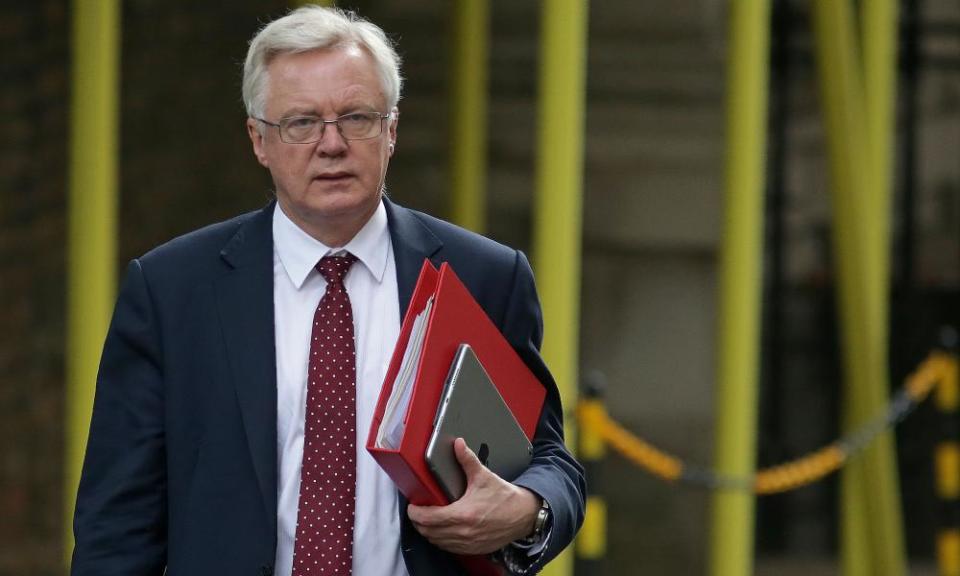All for the best Brexit in the best of all possible worlds? | Letters

Miriam González Durántez is right to raise questions about the US-funded rightwing Legatum Institute, which from its Mayfair mansion has become the main cheerleader for Brexit on the basis of anti-European ideology and little knowledge of how trade works (How to beat the Brexit clock, 19 July).
But she is wrong to say British business should take over negotiations. This is the category error that many make – namely, that there is a business-type “deal” based on splitting differences, and that with more knowledgable EU experts than the current British Brexit minister all would be well.
In fact, the EU27 have said until blue in the face that they cannot alter their common rulebook, their laws, their modus operandi, warts and all, to create a special status for Britain that allows most of the advantages of EU membership but none of the responsibilities and financial obligations. Ms González Durántez could form a negotiating team of all her favourite CBI CEOs and it would make no difference. What business should be doing is negotiating with the British people in the sense of explaining to them and their MPs that the amputational Brexit that David Davis, Liam Fox, Michael Gove, Andrea Leadsom, Chris Grayling, Priti Patel and others want will be economic suicide for Britain.
There are plenty of outfits campaigning against Brexit, but the sum of their parts does not make a coherent and convincing whole. According to polling funded by the Economic and Social Research Council, just 4.2% of Labour party members support leaving the single market (Report, 18 July), yet Labour remains stubbornly wedded to this proposition despite the fact that it is identical with core Tory-Ukip hard Brexit demands. Business at all levels, and especially outside of London, needs to focus on events, communication, discussing with local employees and the communities they live in about the huge damage Brexit will do to jobs and incomes. Sending City missions to Brussels or having nice lunches in Chevening is a waste of time.
Dr Denis MacShane
Former Europe minister
• Miriam González Durántez is mistaken in her characterisation of the Legatum Institute. The institute is committed to positioning the UK for the best possible Brexit – one that is open and able to generate the jobs, growth and prosperity we need to provide genuine opportunity for the people of Britain. Our opinion has consistently been that the only way for the UK to embrace the global trading role it desires is to leave both the customs union and the single market. As an independent charity, this is a view we have been advancing to people on all sides of the debate.
As an institute, we were neutral during the referendum campaign. Now that Britain has voted to leave the EU, our focus has been on maximising the opportunities this presents. We are committed to playing a constructive role in the public debate around Brexit, drawing upon our expertise: we created our special trade commission to bring together the world’s foremost experts on trade. Crawford Falconer, who was recently appointed by the government as its chief trade negotiation adviser, is one of several members with first-hand experience of negotiating with the EU.
Such expertise has an important contribution to make. Young people in particular do not want to be told that all is lost; they want to be offered a hopeful vision of a global future outside of the EU. Getting Brexit right matters to all of us, and we should all be seeking to play a constructive role in the process. That is what we’re doing at the Legatum Institute. And it’s something we’re proud of.
Philippa Stroud
CEO, Legatum Institute
• The Labour members who want the UK to remain in the European single market and customs union should be careful what they wish for. The only countries that can have full membership of the single market are EU member states. Others, such as Efta members, can participate in it by belonging to the European Economic Area but have to accept the EU’s four freedoms in goods, services, capital and people.
What this means in practice is that a post-Brexit British government would be obliged to tender its public services and utilities to the benefit of European multinational capital. It would be unable to prevent the further privatisation and fragmentation of the public realm and, crucially, would be powerless to stop unscrupulous employers continuing to exploit free movement of labour to undermine collective bargaining by the deployment of cheap labour from other parts of the EU, a practice that informed many trade unionists’ decision to vote for Brexit in the first place. As for the customs union, outside its own borders the EU is extremely protectionist, and its neoliberal free trade policy is not something that should be emulated.
Nevertheless, given the proximity and importance of the wider European market to the UK, it is entirely logical that agreement is reached on a mutually beneficial trading relationship. However, some of the more conservative elements in the British trade union movement also seem to think that their interests, and those of the working class, are synonymous with those of big business and are echoing the call for access to the single market and customs union on the basis of the current EU rules, thus running the risk of inheriting the worst aspects of EU trade policy without any influence to change it once Brexit becomes a reality.
Bert Schouwenburg
International officer, GMB
• Join the debate – email guardian.letters@theguardian.com
• Read more Guardian letters – click here to visit gu.com/letters

 Yahoo News
Yahoo News 